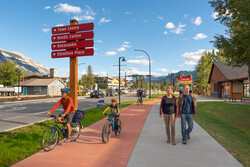Climate change is already affecting our mountain community, increasing the risk of hazards such as fire, flood, and drought. In the years to come, Canmore will be getting warmer, wetter, with wilder weather.
We need to work together to increase the resilience of our community as we adapt to and mitigate these climate impacts on our road to a net-zero future.

Taking Action
We are committed to reducing the greenhouse gas (GHG) emissions of our corporate operations and those of the community. We have set a target of net-zero GHG emissions by 2050.
Key Actions and Progress
Key Actions
- Adopt tools and resources to integrate a climate lens into municipal planning and decision-making.
- Undertake municipal projects to act as demonstrations to the community.
Past Progress
- Building LEED Silver buildings and a net-zero Fire Station utilizing air source heat pumps.
- Installing over 2,900 solar panels on municipal rooftops.
- Transitioning to electric fleet vehicles.
Key Actions
- Build net-zero buildings that are also resilient to extreme heat and wildfire smoke.
- Convert to heat pumps for space heating and cooling.
- Create programs to reduce energy poverty.
Past Progress
- Implementing the Clean Energy Improvement Program, which enables homeowners to install renewable energy systems and improve energy efficiency, with financing paid back over time via property taxes.
- Piloting the Home Upgrades Program, which provided fully funded retrofits to low-income homeowners to reduce energy poverty.
Key Actions
- Increase local and imported renewable energy.
- Ensure that energy supply is protected from extreme weather events and other climate-change induced hazards.
Past Progress
- Supporting over 75 rooftop solar arrays installed on homes and businesses through our Solar Incentive Program.
Key Actions
- Ensure natural systems are healthy and intact to protect waterways and help moderate temperature, manage extreme storms, and preserve air quality.
- Prioritize reducing wildfire risk and providing shade in landscape planning and design.
Past Progress
- Reducing wildfire risk by FireSmarting and removing hazard trees damaged by pine beetle.
- Secured funding for the planning of community fireguards.
Key Actions
- Increase flood protection measures for the wastewater treatment plant.
- Review community-wide evacuation plans and routes with a focus on neighbourhoods with vulnerable populations.
Past Progress
- Creating emergency response plans for extreme heat and wildfire smoke, in addition to existing wildfire and flood emergency response plans.
- Designating facilities as cooling centres and clean air shelters.
- Prescribing minimum building floor elevations in flood fringe areas to protect from Bow River flooding.
- Establishing a Seasonal Hazard Monitoring Program for steep creeks, the Bow River, drought, and wildfire.
- Building the Cougar Creek debris flood retention structure to reduce risk to downstream properties in the event of a future flood.
Key Actions
- Expand transit options within Canmore and to nearby destinations.
- Increase walking and biking for short trips by expanding the active transportation network.
- Increase access to at-home and public electric vehicle charging stations.
Past Progress
- Implementing free local transit partially funded by paid parking.
- Introducing a new bus route to Quarry Lake, the Nordic Centre and the Grassi Lakes trailhead.
- Installing over 80 km of biking and walking paths.
- Reducing speed limits in the Town Centre to 30 km/hour.
- Piloting an e-bike incentive program for residents in the Affordable Services Program.
Key Actions
- Develop and implement a water conservation strategy.
- Reduce total waste generation.
- Utilize energy efficient and renewable technologies at the wastewater treatment plant.
Past Progress
- Implementing a community-wide food waste composting program.
- Introducing a bylaw requiring all restaurants to divert food waste from garbage.
- Developing a drought monitoring approach with Mandatory Outdoor Water Restriction guidelines.
What You Can Do
- Check out our incentive programs.
- Sign up for the Biosphere Institute of the Bow Valley’s SHIFT newsletter for upcoming community-based initiatives.

